Business.com aims to help business owners make informed decisions to support and grow their companies. We research and recommend products and services suitable for various business types, investing thousands of hours each year in this process.
As a business, we need to generate revenue to sustain our content. We have financial relationships with some companies we cover, earning commissions when readers purchase from our partners or share information about their needs. These relationships do not dictate our advice and recommendations. Our editorial team independently evaluates and recommends products and services based on their research and expertise. Learn more about our process and partners here.
NetSuite Accounting Software Review and Pricing

Table of Contents
- NetSuite uses modular pricing, so you pay only for the features you need.
- The platform is designed for global operations, making it a strong choice for small businesses scaling up to midsize or large organizations.
- With more than 42,000 businesses worldwide using the software, NetSuite is one of the most recognized ERP brands.
- NetSuite is generally considered a high-cost solution.
- The system has a steep learning curve, which can be challenging for teams without dedicated IT or accounting staff.
- The company doesn't publish standard pricing or offer a free trial, so you'll need to contact Oracle directly for a custom quote.
Looking for more options?
Check out The Best Accounting Software for Multiple Businesses business.com recommends.
Business owners looking for a comprehensive accounting software solution needn’t settle for more traditional offerings. Instead, we highly recommend considering Oracle NetSuite — our pick for the best accounting software platform with enterprise resource planning (ERP) tools. NetSuite has been a leading brand name in the ERP space for many years. Your business can use Oracle NetSuite for all its financial tracking needs and to automate accounting functions. More importantly, you can use NetSuite’s full ERP solution to manage complex business functions on a global scale, going above and beyond traditional accounting programs.
Oracle NetSuite Accounting Editor's Rating:
9.2 / 10
- Payments
- 9.5/10
- Automatic invoicing
- 9.5/10
- Third-party integrations
- 8.5/10
- Mobile app
- 8/10
- 24/7 customer service
- 9.5/10
Why We Chose Oracle NetSuite as the Best for ERP Tools
An established business with many moving parts requires advanced technology capable of managing complex processes. This is where ERP software can help. ERP refers to an integrated software solution used to manage business processes. Although accounting is perhaps the most critical part of ERP, other modules include human resources (HR) management, sales, marketing and supply chain.
Oracle NetSuite is one of the leading solutions in the ERP industry, particularly for those looking for accounting assistance. This multifaceted solution can expedite an organization’s financial transactions, such as accounts receivable (A/R) and accounts payable (A/P), while tracking compliance obligations. It features numerous reporting, planning and billing capabilities and is designed for global use, accommodating multiple currencies. It can be easily integrated with other software, including Oracle’s suite of business solutions, for full-scale enterprise resource planning. For these reasons and more, we’ve chosen Oracle NetSuite as the best accounting software with ERP tools.
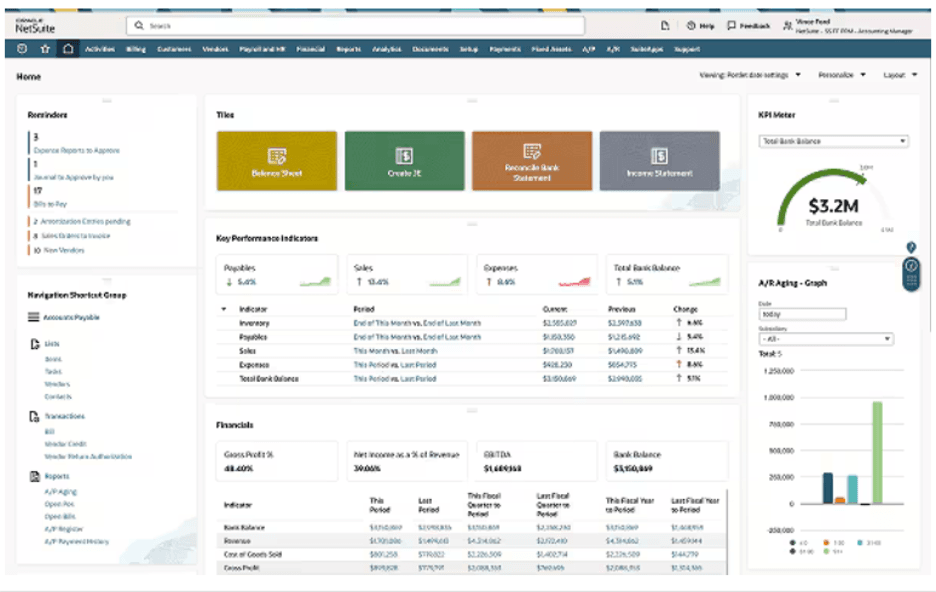
Ease of Use
Oracle NetSuite is an integrated software solution for managing finances, sales, marketing and supply chain tasks, along with HR through its Human Capital Management module. NetSuite’s capabilities go well beyond those of basic accounting and bookkeeping software. In fact, we found it far more complex than mass-market accounting solutions like QuickBooks Online. (Read our review of QuickBooks Online to learn more.)
Like most accounting platforms we tested, NetSuite displays key business metrics on its dashboards. The interface is packed with charts, tools and drop-down menus. While NetSuite is easier to use than some other ERP systems, it isn’t as user-friendly as small business accounting platforms designed with simplicity in mind.
Because of its complexity, many businesses may need to hire a consultant to get the most from the software. That said, the steep learning curve comes with a payoff: extremely powerful tools and capabilities you won’t find in less expensive alternatives.
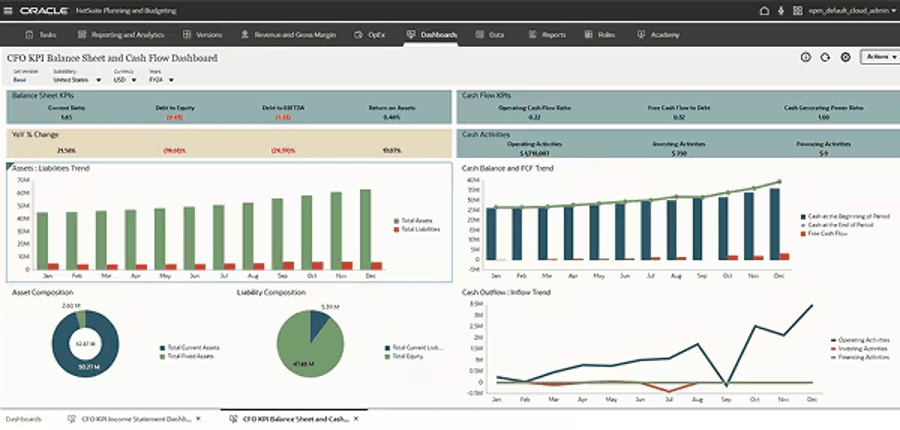
Oracle NetSuite Features
Oracle NetSuite goes beyond standard accounting software features. When used as part of a larger ERP solution, it integrates accounting with functions like inventory management to give you a complete view of your business’s income and expenses. Here’s an overview of the key features we found when testing NetSuite’s accounting tools.
Financial Process and Operations Management
We were impressed with how NetSuite helps businesses design and implement financial processes through its accounting tools. The software seamlessly integrates accounting functions with management systems, giving managers real-time access to financial data. This allows them to generate reports quickly, address delays and keep operations on track.
NetSuite’s general ledger enables organizations to input and monitor all financial data in a customizable format. It supports enhanced audit trails, reporting functionality and tools to adapt to new management requirements.
We also like how NetSuite’s accounts payable and accounts receivable features consolidate financial data into an automated system. Additionally, the platform features tax management programs designed for companies with international operations. [Read related article: What Are Assets in Accounting and Business?]
Billing
NetSuite’s billing features are more robust than those of many competitors we reviewed. For businesses with multiple clients, vendors or partners, the software can streamline billing across different pricing models, including subscription business models. Its centralized framework manages transactions and projects, feeding everything directly into the billing engine.
The platform also supports recurring billing, giving companies flexibility and control over how they invoice customers. One feature we especially liked is the ability to upload vendor bills. NetSuite scans the document and extracts the data automatically, eliminating the need for manual entry.
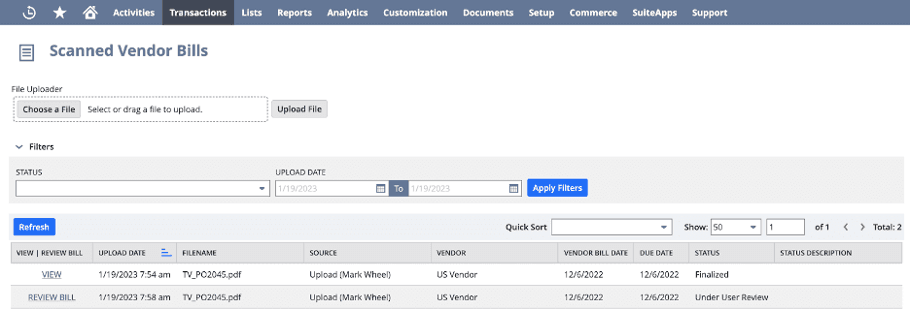
Revenue Recognition
We appreciate that NetSuite helps businesses stay compliant with accounting standards while reporting financial results promptly. The platform’s revenue recognition tools let you schedule, calculate and report revenue quickly on financial statements — an essential feature for companies managing complex contracts or long-term projects. [Learn how revenue differs from income.]
Financial Planning and Reporting
Big data analysis powers NetSuite’s financial planning and reporting capabilities. We found it especially valuable that the platform supports budget planning with built-in planning and budgeting tools. One standout feature is the ability to use your business’s data to forecast revenue, run what-if scenarios and produce budgets. NetSuite can also incorporate current data into future projections and generate detailed reports to guide decision-making.
Global Account Management and Consolidation
We like that NetSuite’s OneWorld module can support businesses expanding globally. Running operations in multiple countries or introducing products and services into new markets often creates accounting challenges. NetSuite’s financial engine makes it easier to manage finances across your entire organization, no matter where operations take place.
We appreciate that the software supports 27 languages to help bridge communication gaps and includes multicurrency management for over 190 currencies. NetSuite automatically calculates exchange rates for
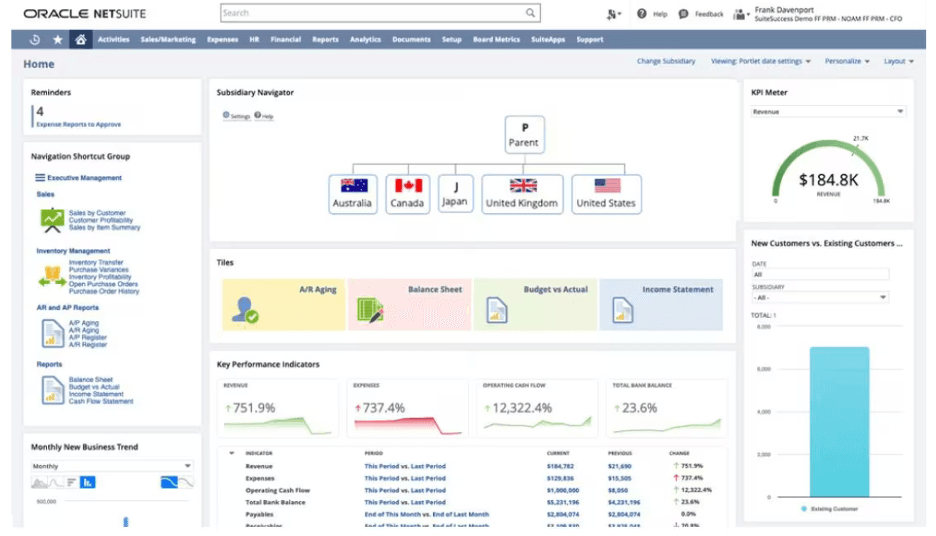
Governance, Risk and Compliance
We were impressed that NetSuite helps organizations set up and monitor systems to meet regulatory requirements and address common HR compliance challenges. As your company grows, the platform allows you to adapt these systems without disruption. NetSuite is also audit-ready, making it easy to view and investigate financial issues as they arise.
The software complies with key standards, including ASC 606, Generally Accepted Accounting Principles (GAAP) and the Sarbanes-Oxley Act (SOX). Beyond meeting regulations, NetSuite strengthens governance, risk and compliance (GRC) programs by helping companies establish ongoing risk management practices. This makes it easier to spot potential problems early and reduce costs by addressing them before they escalate.
Integrations
As an ERP platform, Oracle NetSuite offers seamless integration with all NetSuite modules, including accounting, inventory management, customer relationship management (CRM) and human capital management. It also integrates with many third-party business applications and offers open APIs for custom integrations.
We like that NetSuite works with platforms like Amazon and Shopify to simplify e-commerce operations. For example, Shopify payments reconcile directly in NetSuite, and users can purchase Amazon shipping labels without leaving the system.
Another useful tool is the NetSuite Connector, which provides prebuilt integrations for e-commerce, marketplaces, logistics and POS systems. It automates data flows such as orders, inventory and payments across platforms like Amazon, Shopify and Square, helping reduce manual work and speed deployment.
We were also impressed that NetSuite provides a dedicated implementation team (for an additional fee) to help integrate the system with your other business software. These experts can also build new integrations and support project management planning. For teams that want to explore on their own, NetSuite’s Resource Center includes blogs, case studies and demos.
Warehouse Management
NetSuite’s warehouse management features are a rare find among accounting software competitors. Its warehouse and fulfillment module helps businesses manage inbound logistics and broader inventory tasks. With NetSuite, companies can generate and send purchase orders to suppliers and flag high-priority tickets to an “expedite” list for faster processing.
The outbound processing feature tracks goods as they leave the warehouse and are shipped directly to stores or consumers. It includes a “pick, pack and ship” tool that alerts warehouse staff when a product is ready for transport. As items move through the warehouse, NetSuite automatically updates inventory counts to reflect real-time stock levels.
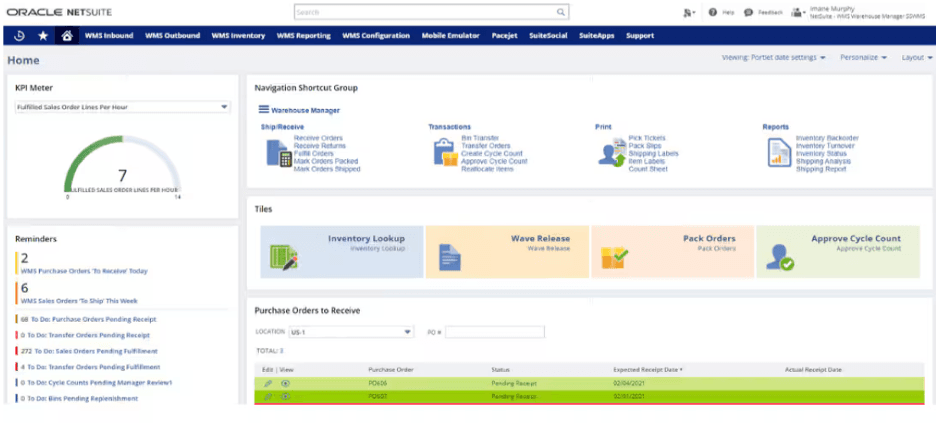
Inventory Tracking
NetSuite’s inventory tracking features include multilocation fulfillment, replenishment and traceability, providing businesses with full visibility across all locations. Accurate inventory management is supported by barcoding, batch tracking and serial tracking, which help pinpoint where items are stored in a warehouse.
We were especially impressed by NetSuite’s real-time inventory tracking. When employees receive a product, they scan it into the system as they move it from the loading dock to the appropriate lot, aisle and bin. Once it’s placed, they scan the item again, and NetSuite automatically records its location along with the date and time.
Inventory Auditing
We were impressed by NetSuite’s inventory auditing tools. Once an item is stored in the warehouse, the system regularly alerts staff to perform “cycle counts,” or inventory audits. These reconcile the actual stock on hand with the records maintained by NetSuite’s inventory-tracking system.
The auditing features also streamline the process by cataloging products based on value, quantity and characteristics such as color, size, material and type. Best of all, businesses don’t need to pause transactions during cycle counts. If a sale occurs mid-count, the system automatically alerts the auditing staff so they can include the update in the final tally.
Order Management
NetSuite’s order management tools help warehouses maintain the right stock levels without over-ordering and ending up with excess inventory and dead stock — products that can’t be sold quickly. The system automatically analyzes order and inventory data to determine optimal reorder points for each product, replenishing stock to a set threshold when it runs low. It also accounts for supplier lead times identified through the Container Tracking inbound logistics tool, adjusting minimum quantities based on how long replenishment takes.
We especially like the features available through NetSuite Ship Central. This module helps businesses discover optimal shipping rates, create international shipping and return labels, and calculate costs more accurately using company averages and carton weights.
Multiple-Location Management
We also appreciated NetSuite’s multilocation management tool, which supports both warehouse operations and tracking warehouse KPIs. With lot tracking, bin tracking and serial tracking, businesses can monitor the flow of goods across multiple sites in real time. NetSuite also adjusts stock levels automatically to help meet demand across all locations.
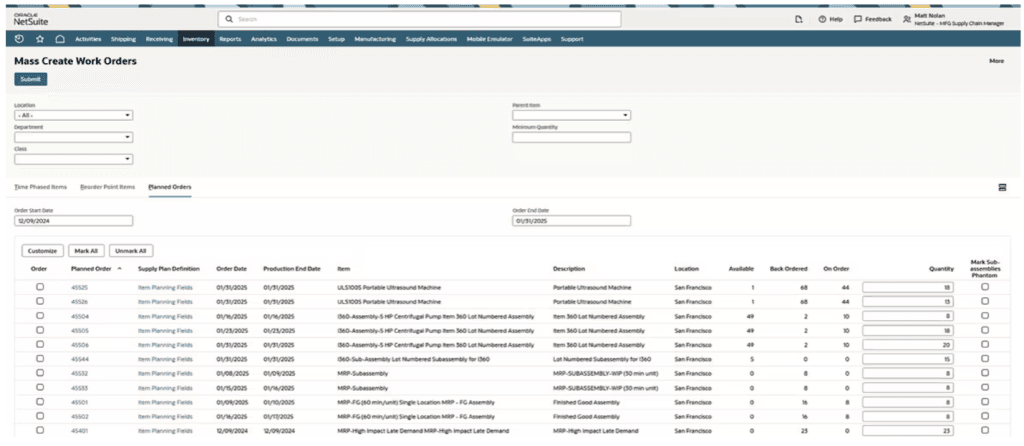
Mobile App
NetSuite offers a mobile app for Apple and Android devices, giving you access to business functions on the go. With the app, you can create and customize records, track expenses and time, manage your calendar, and approve sales orders and expense reports.
That said, the app is one of NetSuite’s weaker points. It scores just 2.1 out of 5 on Google Play and 2.9 out of 5 in the Apple App Store — notably lower than the ratings of many other accounting software apps we reviewed.
Oracle NetSuite Pricing
Oracle NetSuite’s ERP platform includes financial management, inventory management, point-of-sale, CRM and employee management software. Pricing depends on factors such as your company’s size, revenue and the modules you need, so costs can vary widely.
To receive an accurate estimate, you’ll need to speak directly with an Oracle sales representative, who will prepare a custom quote based on your industry and requirements. From our research, pricing starts at around $99 per user, per month, plus a $999 monthly licensing fee. While this base price offers a benchmark, actual costs can range anywhere from $40,000 to over $1 million annually, depending on business scale and complexity.
Because of its cost and scope, NetSuite may not be the best option for small businesses with simple accounting needs. However, midsize, scaling, large and international businesses are well-positioned to benefit from its comprehensive ERP ecosystem, which can save time and money compared to piecing together multiple standalone software solutions.
Implementation and Onboarding
Our research found that NetSuite onboarding isn’t as straightforward as with many other accounting software platforms. To begin, you’ll need to contact the company’s sales team for a free product tour, and while demos are available on NetSuite’s website, there’s no free trial option.
Implementing NetSuite as a new user can also be challenging. Setup may take up to four months and cost thousands of dollars, depending on the complexity of your needs. In fact, an entire industry of consultants exists specifically to help businesses implement and customize NetSuite.
Larger companies can typically absorb these additional costs, but smaller businesses may find them prohibitive. If your organization is on a tighter budget, you may want to consider a dedicated accounting solution that integrates with your other systems and manages finances without a steep learning curve.
Customer Support
Oracle NetSuite offers a tiered customer support system that goes beyond basic resources, though some advanced services come at an extra cost:
- Basic Support (included): All subscriptions include 24/7 help for critical issues, online case submission, access to SuiteAnswers (knowledge base, FAQs and training resources) and community forums.
- Live support options: Across tiers, users can reach NetSuite by phone or live chat, and the chatbot can answer simple questions or connect you with a representative.
- Premium Support (upgrade): Adds help for non-critical issues, priority case queuing, weekend coverage and early release notifications. This option is best for businesses that want faster response times and additional guidance. (Contact NetSuite for pricing.)
- Advanced Customer Support (upgrade): A subscription-based service for midsize and enterprise businesses that need proactive, hands-on assistance. ACS includes performance monitoring, configuration help, sandbox/testing environment support, release guidance and access to NetSuite experts for optimization and solution architecture. (Contact NetSuite for pricing.)
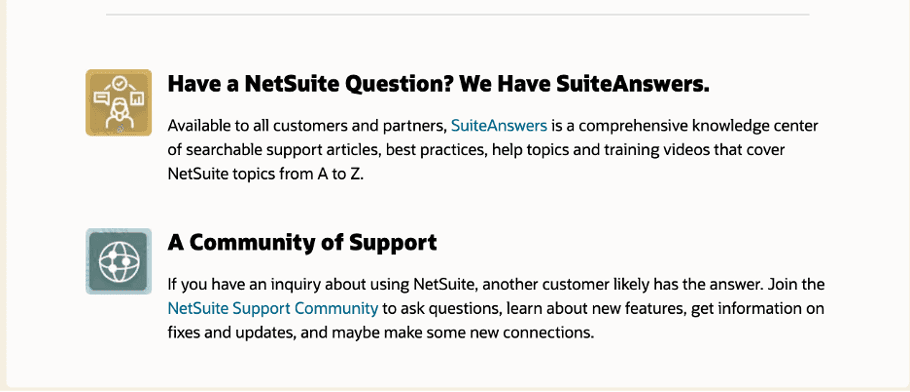
Limitations
With such a comprehensive set of features, Oracle NetSuite’s main limitations are its potentially high price point and steep learning curve. Implementation can be lengthy, often taking months, and fully mastering the platform may take even longer. Despite (or perhaps because of) its extensive functionality, NetSuite is not the most user-friendly system, which makes it a poor fit for small businesses with limited resources.
That said, it remains an excellent option for established companies with the budget and staff to support it. Small business owners with simpler needs should consider lower-priced alternatives. For example, as we note in our review of Zoho Books, this solution is a strong choice for automating accounting processes at a fraction of the cost.
Methodology
We researched and analyzed dozens of the best accounting software solutions to help small businesses choose the right accounting software for their needs. To generate our quantitative score and use case, we reviewed software features like payment and invoicing capabilities, integrations, mobile apps, report generation, supported user count and customer service. We also assessed pricing and the availability of free trials. We gathered information from company websites and test sessions, and we weighed customer testimonials on the software’s pros and cons.
When looking for the best accounting software with ERP tools specifically, we focused on how product breadth creates a unified system to help businesses meet complex operational challenges. We considered the features that go beyond traditional accounting functions to allow for holistic enterprise resource planning. (Read more about our editorial process.)
Oracle NetSuite FAQs
Bottom Line
We recommend Oracle NetSuite for …
- Organizations looking for a platform that combines ERP and accounting functionality with other business tools.
- Growing midsize or large businesses (or small businesses making that transition) that require a powerful, all-in-one ERP solution.
- Businesses with the resources to support Oracle NetSuite beyond its monthly costs, such as consultants to assist with training and implementation.
We don’t recommend Oracle NetSuite for …
- Companies looking for basic accounting software.
- Small businesses without the resources or budget to accommodate NetSuite.
- Businesses that want to avoid the steep learning curve of a complex ERP solution.
Natalie Hamingson contributed to this review.

Looking for more options?
Check out The Best Accounting Software for Multiple Businesses business.com recommends.